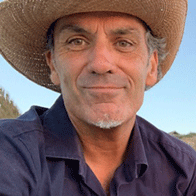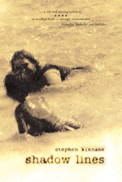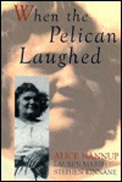Stephen Kinnane – September 20 2020
International Day of Peace – September 21
 Steve is a Marda Marda man of the East Kimberley Miriwoong people on his mother’s side. An award-winning writer and active researcher for more than 25 years, Steve’s interests include Aboriginal history and creative documentary. He holds a Bachelor of Arts (Honours) in Sustainability and is currently a PhD candidate at the Australian National University (ANU). Steve has lectured in Australian Indigenous Studies and Sustainability at Murdoch University and completed a Visiting Research Fellowship at the Australian Institute of Aboriginal and Torres Strait Islander Studies (AIATSIS) of which he has also been Chairperson and Council Member. Currently part of the WA Museum’s Curatorial Team – New Museum Project, Steve is also a Magabala Books Director, Senior Researcher for the Nulungu Research Institute of the University of Notre Dame Australia, Broome, and Board Member of the Australian Dictionary of Biography at ANU. His recent publications include the chapter ‘Indigenous Australia’ (in collaboration with Anna Haebich) for the Cambridge History of Australia, the chapter ‘Blood History’ for the First Australians book accompanying the First Australians television series, and reports and chapters examining how communities develop sustainable livelihoods. Steve’s other work includes the ABC TV documentary, The Coolbaroo Club, which he co-wrote and produced.
Steve is a Marda Marda man of the East Kimberley Miriwoong people on his mother’s side. An award-winning writer and active researcher for more than 25 years, Steve’s interests include Aboriginal history and creative documentary. He holds a Bachelor of Arts (Honours) in Sustainability and is currently a PhD candidate at the Australian National University (ANU). Steve has lectured in Australian Indigenous Studies and Sustainability at Murdoch University and completed a Visiting Research Fellowship at the Australian Institute of Aboriginal and Torres Strait Islander Studies (AIATSIS) of which he has also been Chairperson and Council Member. Currently part of the WA Museum’s Curatorial Team – New Museum Project, Steve is also a Magabala Books Director, Senior Researcher for the Nulungu Research Institute of the University of Notre Dame Australia, Broome, and Board Member of the Australian Dictionary of Biography at ANU. His recent publications include the chapter ‘Indigenous Australia’ (in collaboration with Anna Haebich) for the Cambridge History of Australia, the chapter ‘Blood History’ for the First Australians book accompanying the First Australians television series, and reports and chapters examining how communities develop sustainable livelihoods. Steve’s other work includes the ABC TV documentary, The Coolbaroo Club, which he co-wrote and produced.
 Shadow Lines
Shadow Lines
Fremantle Arts Centre Press, 2002; ISBN 9781863682374
Shadow Lines is the story of Jessie Argyle, born in the remote East Kimberley and taken from her Aboriginal family at the age of five, and Edward Smith, a young Englishman escaping the rigid strictures of London. In a society deeply divided on racial lines, Edward and Jessie met, fell in love and, against strong opposition, eventually married. Despite unrelenting surveillance and harassment, the Smith home was a centre for Aboriginal cultural and social life for over thirty years. A deeply personal story of two remarkable people. A powerful and lyrical work by a writer of vision and imagination.
 When the Pelican Laughed in collaboration with Alice Nannup & Lauren Marsh
When the Pelican Laughed in collaboration with Alice Nannup & Lauren Marsh
Fremantle Arts Centre Press, 2001; ISBN 9781863683289
The next morning when I woke up I remembered their dance and I said to my mother, ‘Nganka, do you think I could be a Brolga?’ ‘No,’ she said, ‘you Wari, you’re a jutarrara (pelican), and you can’t change that.’
When the Pelican Laughed tells the remarkable story of Alice Nannup, born on a Pilbara station in 1911 to an Aboriginal mother and European father, taken South at the age of 12 and trained in domestic service. After a full and eventful life, including many battles with authority and raising ten children, she returned home 64 years later ‘to make peace with my country’. When the Pelican Laughed is a spirited and deeply moving story, full of humour and insight. There are many unsung heroines in Black Australia, and Alice Nannup is one of them.
